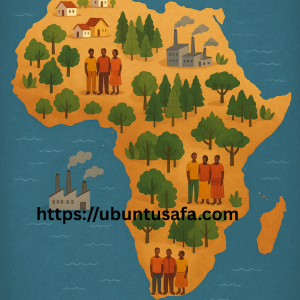What does it mean for African dignity and pride when foreign companies control key industries but locals remain poor?

African Dignity and Pride in the Era of Foreign-Controlled Industries-
Africa, a continent endowed with abundant natural resources and human capital, continues to face the paradox of wealth alongside widespread poverty. While foreign companies—particularly Chinese, European, and American—control key industries such as mining, telecommunications, and manufacturing, the majority of local populations struggle to benefit meaningfully from these sectors. This situation has profound implications for African dignity, pride, and the continent’s ability to assert economic and political independence.
Historical Context of Foreign Control
Africa’s struggle with foreign control over its resources is not a new phenomenon. Colonialism established patterns of resource extraction that prioritized foreign profit over local development. Despite political independence in the 20th century, the economic structures often remained extractive, with multinational corporations continuing to dominate strategic sectors.
Today, the presence of foreign companies in industries such as oil and gas in Nigeria, cobalt mining in the Democratic Republic of Congo, and textile manufacturing in Ethiopia continues this historical pattern. While these companies generate significant revenue, the local workforce often remains underpaid and lacks access to advanced skills and leadership roles.
Economic Implications
1. Limited Wealth Retention
When foreign companies control key industries, a significant portion of profits is repatriated abroad. For instance, multinational mining corporations often send dividends and royalties to parent companies outside Africa, limiting the wealth retained on the continent. This weakens the ability of African governments to reinvest profits into local infrastructure, education, and healthcare.
2. Job Creation and Skill Development
While foreign companies do create employment, these jobs are often low-skilled and poorly compensated. High-value positions—management, technical expertise, and strategic decision-making—are frequently held by expatriates, limiting the development of local talent. The result is a workforce that is economically dependent on low-paying jobs, with minimal upward mobility.
3. Economic Disempowerment
The concentration of control in foreign hands reduces local economic agency. African countries may find it challenging to set policies that benefit citizens when foreign companies dictate terms of investment, production, and trade. This undermines the ability of nations to implement industrialization strategies that foster homegrown entrepreneurship and self-reliance.
Social and Cultural Implications
1. Impact on Dignity and Pride
African dignity is closely linked to the ability to exercise control over one’s resources and destiny. When foreign companies dominate critical sectors while locals remain poor, a sense of marginalization and frustration can emerge. This diminishes national pride and fuels perceptions of neocolonial exploitation.
2. Erosion of Community Cohesion
The economic disparities created by foreign-controlled industries can exacerbate social tensions. Communities surrounding extractive projects often witness environmental degradation and minimal benefit, leading to resentment and weakening social cohesion. In extreme cases, this has sparked protests and conflicts, undermining local stability.
3. Perpetuation of Dependence
Dependence on foreign companies for employment and economic growth can perpetuate a cycle of external reliance. Youth and entrepreneurs may lack incentives to innovate domestically when high-value sectors are controlled externally, limiting the development of local capacity and long-term self-determination.
Political and Strategic Implications
1. Sovereignty Constraints
Foreign dominance in strategic industries limits political maneuverability. African governments may hesitate to implement policies that conflict with the interests of foreign investors, even when such policies would benefit citizens. This compromises sovereignty and undermines the ability to chart independent economic and development paths.
2. Leverage in International Relations
Countries with foreign-controlled industries may become vulnerable to external influence. Foreign companies can indirectly shape policy decisions, trade agreements, and diplomatic stances, effectively using economic leverage to influence governance.
Paths to Restoring Dignity and Pride-
1. Local Participation in Key Industries
Promoting local ownership and management in strategic sectors is crucial. Policies that encourage joint ventures, local equity stakes, and capacity building can ensure that profits and decision-making power are more evenly distributed.
2. Industrial Policy and Skill Development
African governments can invest in technical education, vocational training, and research institutions to develop a skilled workforce capable of taking leadership roles in industries dominated by foreign firms.
3. Economic Diversification
Reducing dependence on foreign-controlled industries through diversification—promoting agriculture, technology, and domestic manufacturing—can strengthen economic resilience and empower local entrepreneurs.
4. Regulatory Oversight
Strengthening oversight of foreign investment can ensure fair labor practices, environmental protections, and local benefit-sharing. Transparent contracts and enforceable regulations prevent exploitation while fostering trust between investors and communities.
The control of key industries by foreign companies in Africa poses significant challenges to the dignity, pride, and empowerment of local populations. While foreign investment can catalyze infrastructure and economic growth, the limited participation of locals in decision-making and high-value roles perpetuates inequality and dependence. Restoring dignity and pride requires deliberate policies that enhance local ownership, skill development, economic diversification, and regulatory oversight. By reclaiming control over their economic destiny, African nations can transform resource wealth into a source of empowerment, pride, and sustainable development.
- Questions and Answers
- Opinion
- Motivational and Inspiring Story
- Technology
- Live and Let live
- Focus
- Geopolitics
- Military-Arms/Equipment
- Sicherheit
- Economy
- Beasts of Nations
- Machine Tools-The “Mother Industry”
- Art
- Causes
- Crafts
- Dance
- Drinks
- Film/Movie
- Fitness
- Food
- Spiele
- Gardening
- Health
- Startseite
- Literature
- Music
- Networking
- Andere
- Party
- Religion
- Shopping
- Sports
- Theater
- Health and Wellness
- News
- Culture

